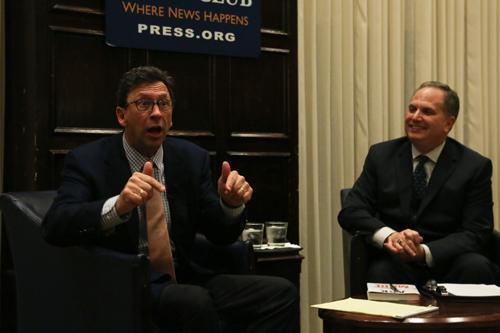School of Media and Public Affairs Director Frank Sesno spoke about his new book “Ask More: The Power of Questions to Open Doors, Uncover Solutions, and Spark Change” at the National Press Club Tuesday night.
Sesno discussed why the art of questioning is crucial for people in any profession, answered audience questions and finished the night with a meet-and-greet and book signing. National Press Committee Chair Mark Hamrick moderated the event.
Here are the key points to take away:
1. The significance of questions
As an Emmy-award winning journalist and former CNN correspondent, Sesno admitted he has always been one to ask questions, a habit which fueled his desire to explore the different facets of an interview.
“I’ve always been curious about people. What motivates, animates, angers and engages them,” Sesno said.
Sesno added that considering the length of his career in journalism, he could have written on many different topics in the media but ultimately felt this subject matter was something unique, interesting and useful for journalists.
“Questions are all around us, but we don’t think about them,” he said. “Questions have an outcome, a strategy, a structure and intentionality.”
2. The importance of listening
When asked about important components of interviewing, Sesno stressed that listening in an interview is just as critical to the quality of the answer as the question itself.
“We don’t listen anymore. All we do is yell and assert,” Sesno said.
He added that interviewers should speak no more than 30 percent of the time in any given interview and put significant effort towards finding a connection with their subjects.
“Trust helps the interviews flow,” Sesno said. “The empathizing part: you get that by asking and then listening.”
3. Issues with media
Sesno expressed concerns with the role of media becoming increasingly influential, saying that news networks have made partisanship worse by reporting stories that create the impression of an insurmountable conflict.
“We are so quick to vilify those who don’t agree, on both sides,” Sesno said.
Sesno added that the polarizing coverage of the Trump administration can alienate viewers, some of whom will dismiss coverage as “an anti-Trump rant” or perceive everyone in power in Washington as incompetent and greedy.
4. Determining the truth
Another concern in journalism is networks spinning events by emphasizing facts that they deem more important or newsworthy, Sesno said.
“Credibility is the indelible ink of any administration or any public spokesperson,” he said.
Sense added that it is the obligation of public figures and media to uphold integrity by presenting the public with all the information needed to make an informed opinion.





